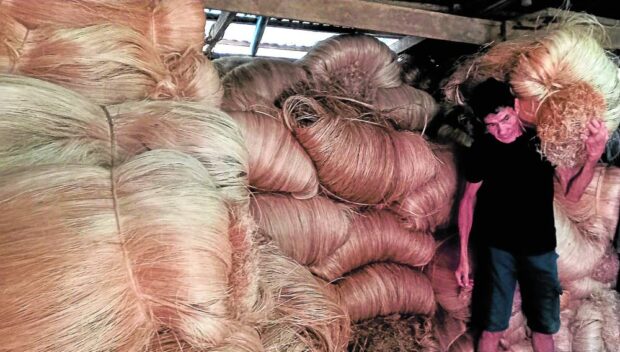
FEELING THE PINCH | An abaca farmer in Virac town, Catanduanes province, shown in this photo taken on Aug. 11, 2023, continues to make a living out of selling abaca fiber despite the prevailing low buying prices. (File photo by MICHAEL B. JAUCIAN / Inquirer Southern Luzon)
VIRAC, Catanduanes, Philippines — Abaca farmers in this island province have begun looking for odd jobs in other places to earn a decent living after the buying prices of manila hemp or abaca fibers continued to drop by more than half since last month.
Farmer Jose Ecal Diamante Jr., 63, a resident of Barangay Tilod in Baras town, said he was already planning to abandon his job as an abaca stripper for a job at a construction site in Metro Manila after feeling the pinch.
“Life is so hard nowadays, and I can feel the negative effect of the low buying price of abaca fiber,” Diamante told the Inquirer in an interview on Aug. 11.
He said he only managed to sell 10 kilos of raw abaca fiber for P250 recently, a significant drop from P500 for the same quantity in previous months.
Diamante lamented that if this situation would continue, more abaca farmers like him would end up starving.
The worst time
Dominador Quintal, 57, a resident of the village of Sto. Niño in Virac town shared Diamante’s sentiment, saying that in his 40 years of experience as an abaca stripper, “This is the worst thing I’ve encountered.”
He said for now he could merely ignore the cheap price since he still needed to earn money and buy food for his family.
“I also feared that the businessmen might not purchase our produce because of oversupply,” he said.
Data from the Philippine Fiber Industry Development Authority (Philfida) in Catanduanes showed that as of July 25, the buying price of the low-grade JK fiber had dropped from P78 to P25 per kilo, owing to its oversupply.
According to Philfida, the buying price for the high-grade S2 also went down from P98 to P80 per kilo, while the I grade, a high-grade fiber, was being sold for P60 per kilo compared to the previous P98 per kilo.
Romulo Fermin, 50, a buyer of abaca fiber, said in a separate interview that he could only sympathize with the plight of the farmers.
“As much as I wanted to help them by buying the product at a higher price, I can’t do it because I’ll be on the losing end. I also have a family to support,” he said.
Appeal
Fermin appealed to the national government, particularly the Department of Labor and Employment and the Department of Social Welfare and Development, to cushion the impact of the dipping buying prices of abaca fiber by extending financial help to the farmers.
Talino at Galing ng Pinoy party-list Rep. Jose “Bong” Teves said he had already proposed a bill that would provide P10,000 as aid to every abaca farmer in the country.
“I am positive that President Marcos Jr. would approve it so that it can help alleviate the dire situation of our abaca farmers,” Teves told the Inquirer.
He said he would also coordinate with the Department of Trade and Industry and ask its officials to come up with a study to help improve the situation of the farmers.
“About 70 percent of the population of Catanduanes relies on abaca farming, and we can’t deny the fact that the province is the top producer of abaca fiber. Sadly, many of our farmers are still suffering from poverty,” he stressed.
Roberto Lusuegro, Philfida fiber officer in Catanduanes, said the drop in the buying price of raw abaca fiber started in the last quarter of 2022.
“This is probably the result of the war between Ukraine and Russia and [an offshoot of] the COVID-19 pandemic. We learned that the United Kingdom and other countries have purchased a lot of fiber for fear of losing or maybe lacking raw materials in the future,” he said.
Lusuegro said one of the reasons why the price remained too low was due to an oversupply of raw materials, particularly the low grade ones.
Shift
“The manufacturing company is demanding high-grade quality, which is S2 and I, wherein the pulp is the huge supply needed while most of those produced by farmers are cordage, which is only considered JK grade,” he said.
He said his office has been reminding abaca farmers that they have to shift to the production of high-quality fiber because both local and international markets demand high-grade fiber.
“We already distributed an initial 585 units of modified abaca stripping knives to an organized group of farmers so that they could upgrade the fiber from JK to I,” he said, noting that if they could supply high-grade fiber, they could negotiate for high buying prices.
According to Lusuegro, the reason why farmers would rather produce JK grade is that they find the stripping activity easier than producing S2 and I.
“We are exerting our efforts, and innovation has been introduced, but they (farmers) are not doing their part. For them, producing high-grade fiber is very tedious,” he said.
Lusuegro added: “This is the sad part because of the low prices, 20 percent of the 14,000 abaca farmers have already left the province.”
Gov. Joseph “Boboy” Cua said the provincial government has been slowly introducing mechanized stripping machines to address the problem.
“Actually, we have ongoing training on how to use the machine in the towns of Caramoran and Bagamanoc, and they (farmers) should embrace and adapt [to] it because this is the only way to improve the quality of the fiber and demand good pricing in the market,” Cua said.